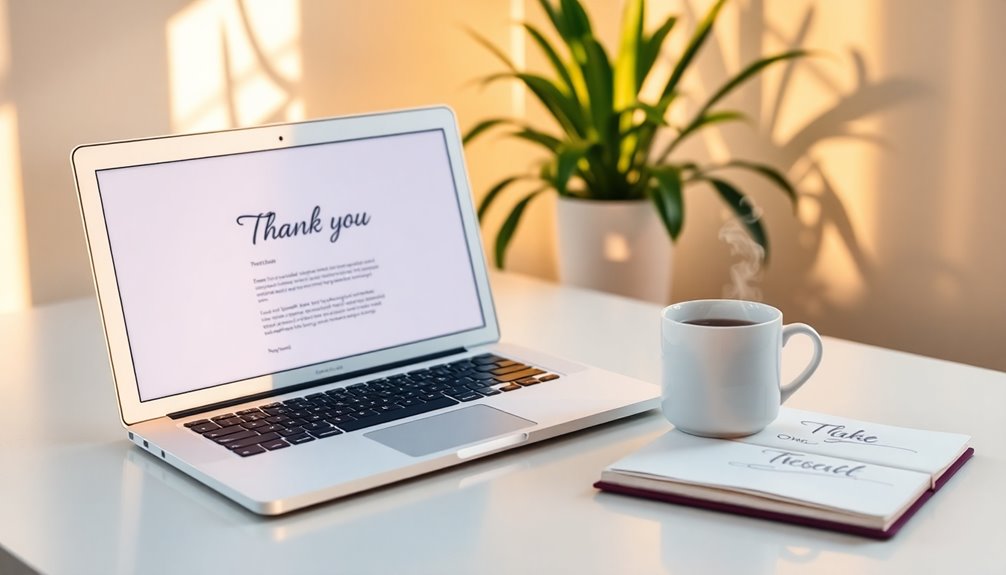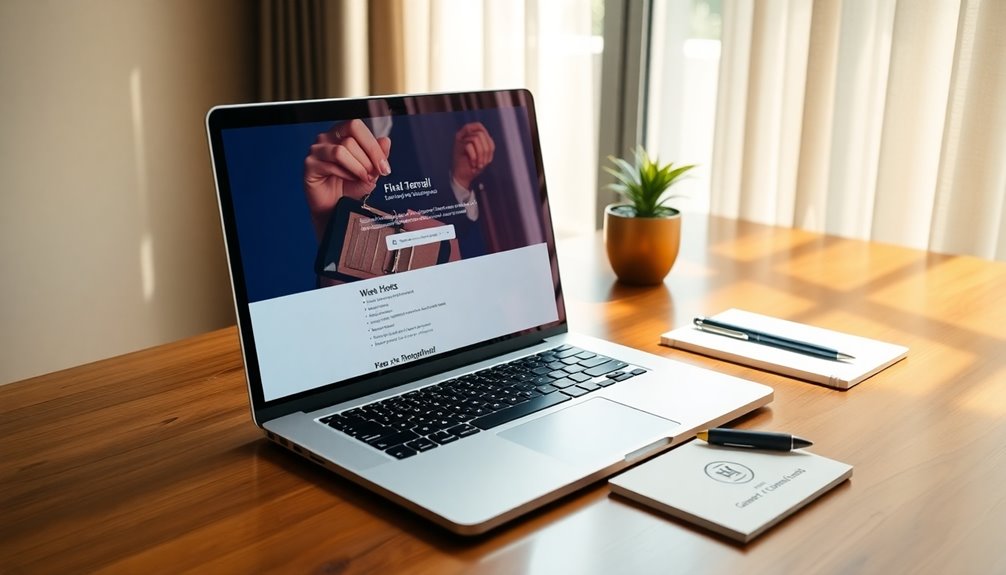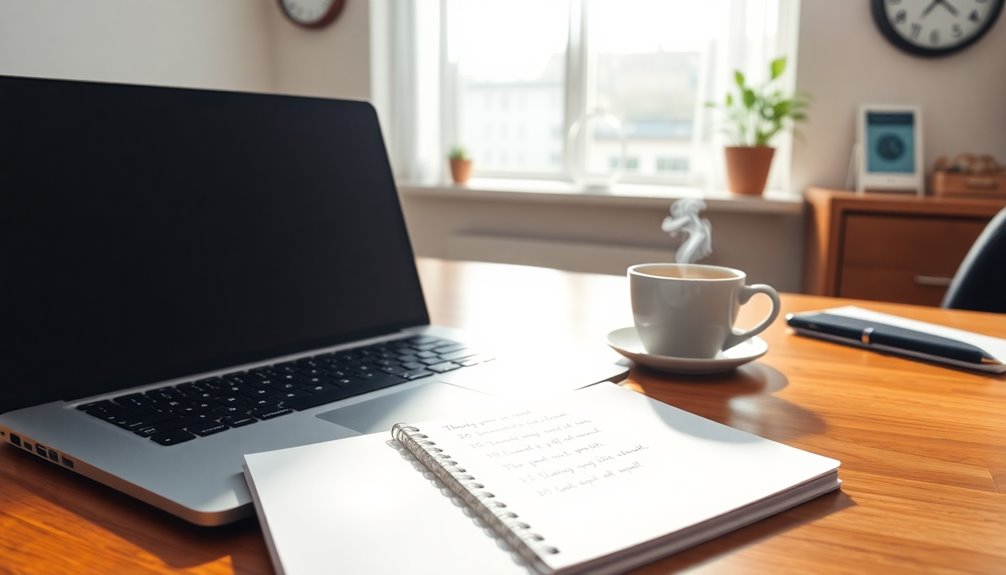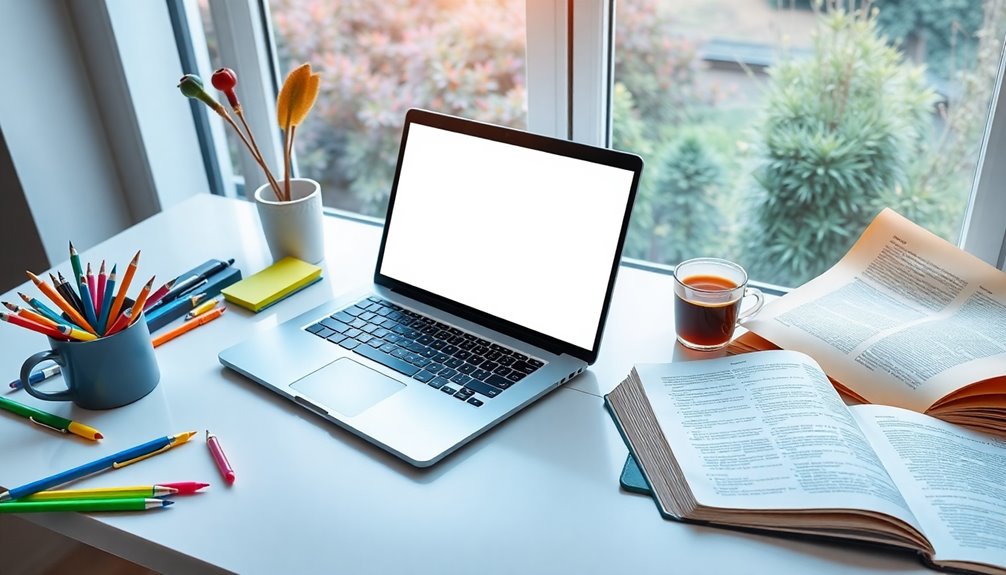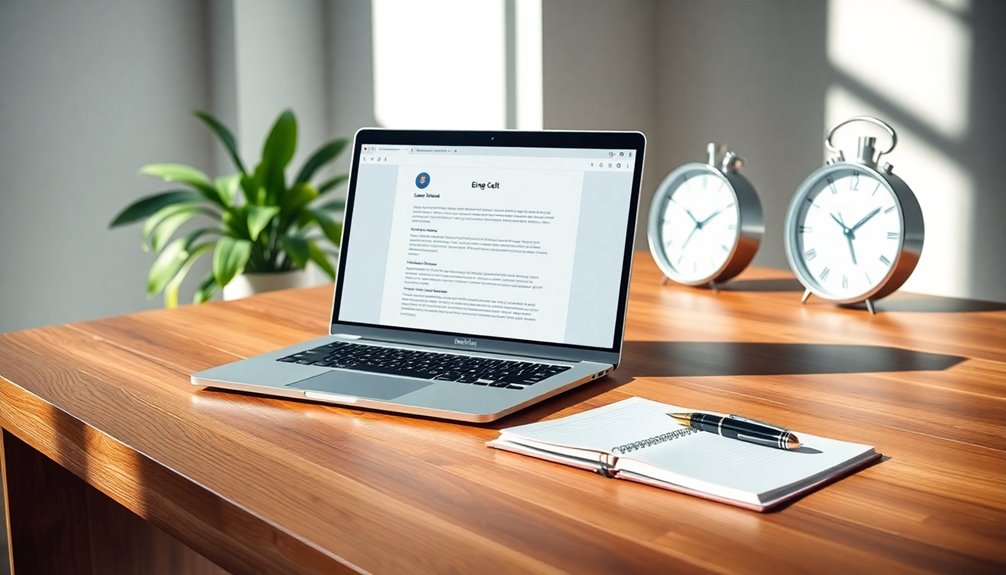To write a thank you email that leaves a lasting impression, send it within 24 hours after your interview. Start with a formal greeting and include the interviewer's name. Personalize the message by mentioning specific details from your conversation. Highlight your qualifications that align with the company's needs, and express genuine appreciation for their time. Keep the email concise and focus on clarity; aim for 100-200 words. Use a professional subject line and proofread for any errors. This attention to detail shows your commitment, helping you stand out even more. There's more to discover on crafting the perfect email!
Key Takeaways
- Send your thank you email within 24 hours of the interview to demonstrate eagerness and respect for the interviewer's time.
- Personalize your message by addressing the interviewer by name and referencing specific details from your conversation.
- Highlight your key qualifications that align with the company's needs to reinforce your suitability for the role.
- Maintain a professional tone, using formal language and proofreading for any grammatical errors to ensure clarity.
- Use a specific subject line, starting with "Thank You," followed by the interviewer's name and position title to grab attention.
Introduction
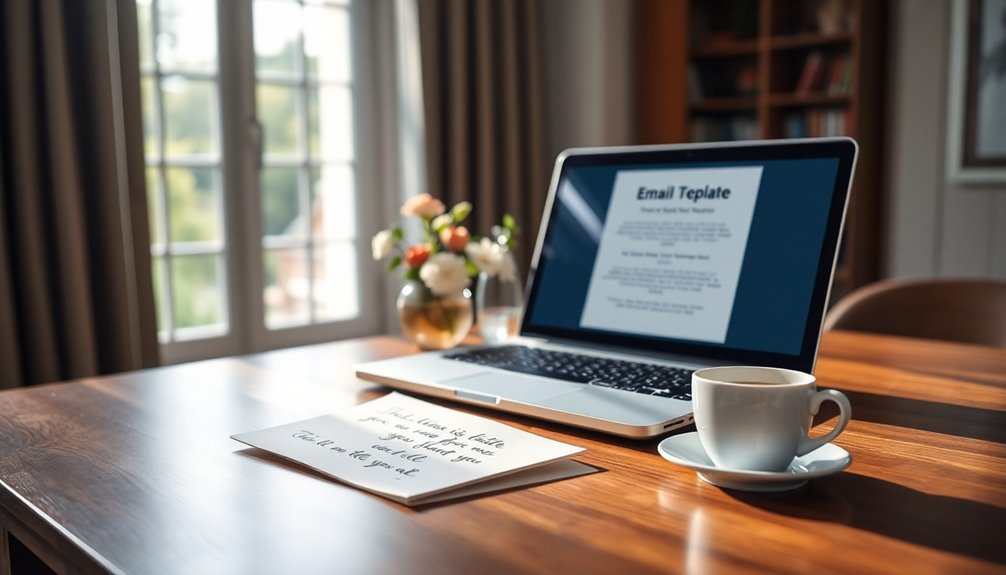
When you land an interview, it's crucial to follow up with a thank you email that reflects your appreciation and professionalism. This small gesture can leave a lasting impression on the interviewer and set you apart from other candidates.
Sending your thank you email within 24 hours shows respect for the interviewer's time and reinforces your enthusiasm for the position.
To make your thank you email effective, personalize it by referencing specific details discussed during the interview. This not only demonstrates your attentiveness but also enhances your memorability—75% of HR professionals say it influences hiring decisions.
Aim for a professional tone while expressing genuine gratitude; 72% of individuals judge effective written communication based on how it's conveyed.
Builds Professional Relationships
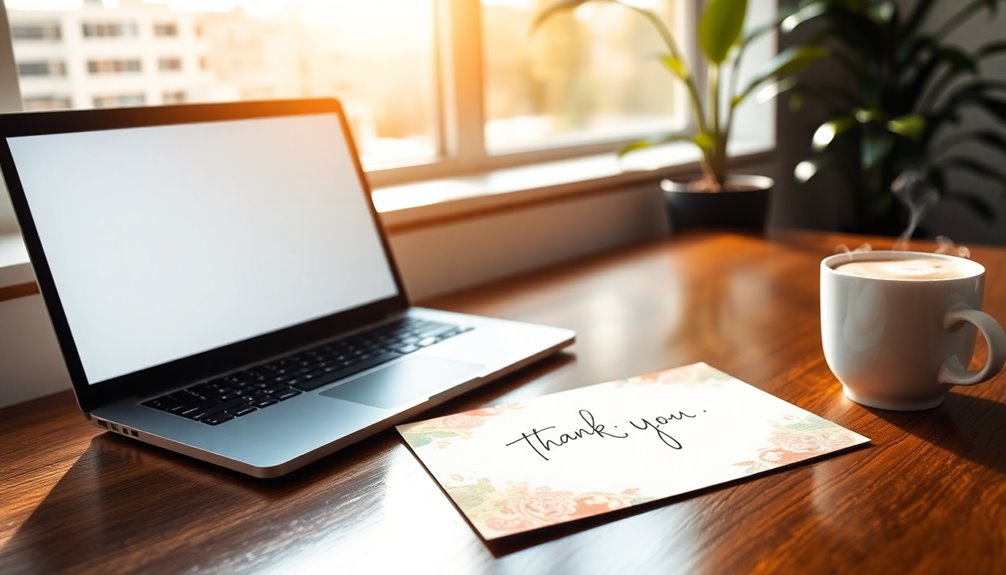
Sending a thank you email immediately after your interview can really strengthen professional relationships. By expressing genuine appreciation, you foster goodwill and respect between yourself and the interviewer.
When you take the time to send a personalized thank you note, referencing specific discussions from your meeting, you not only leave a lasting impression but also differentiate yourself from other candidates. This approach reinforces your connection based on shared interests and insights, while also demonstrating your capacity for open communication which is essential in building strong relationships.
Furthermore, a well-crafted thank you email can lead to increased networking opportunities. Research shows that 72% of individuals assess professional relationships based on the quality of written communication. Additionally, effective communication skills can significantly enhance your overall productivity and time management.
Personalized Recipient Acknowledgment
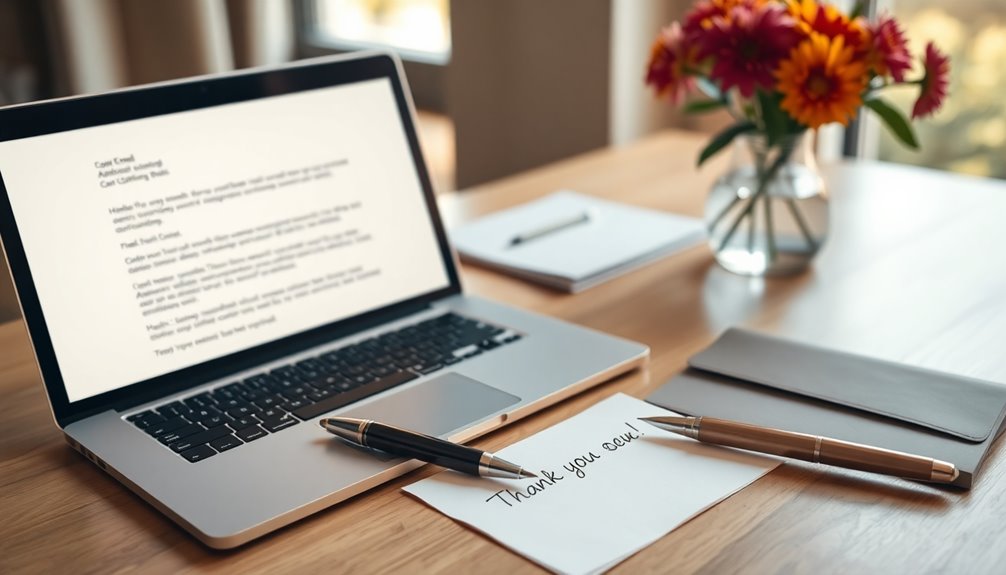
Personalizing your thank you email significantly boosts your chances of leaving a memorable impression. Start by including a personalized recipient acknowledgment, addressing the interviewer by name. This simple step creates a more engaging connection and enhances your professionalism and enthusiasm.
Next, weave in specific details from your conversation, such as projects or challenges discussed. This demonstrates your genuine interest in the role and reinforces your attentiveness. Highlight your key qualifications that align with the company's needs, showing how your skills can contribute to their goals. This tailored approach not only reflects your understanding of the position but also showcases your readiness to fit into their culture.
Adding a personal touch, like referencing the interviewer's insights, can make your thank you email stand out amid generic communications.
Remember to express your appreciation for the interviewer's time and insights; this fosters a sense of mutual respect and strengthens your professional relationship. Additionally, establishing clear boundaries in professional interactions helps maintain respect and understanding, which is crucial for building lasting connections.
When you take these steps, you create a thank you email that not only leaves a lasting impression but also lays the groundwork for future interactions.
Crafting an Impactful Subject Line

An effective subject line is your first opportunity to grab the interviewer's attention and set the tone for your thank you email. To create a lasting impression, make it specific and professional. Start with "Thank You" followed by your name and the position you interviewed for, like "Thank You – [Your Name] for [Position Title]." This clarity ensures recognition and relates directly to your interview.
Keep your subject line concise, ideally under 50 characters, so it displays fully in email previews. You want to capture attention quickly. Personalization is key; consider including the interviewer's name or referencing the specific interview date. This creates an immediate connection and shows your gratitude for their time.
Avoid generic phrases like "Thank You" alone, as they can easily blend in with other emails. Instead, use action-oriented language, such as "Grateful for the Opportunity to Interview," to evoke curiosity and prompt the recipient to open your email.
Dos and Don'ts for Thank You Emails
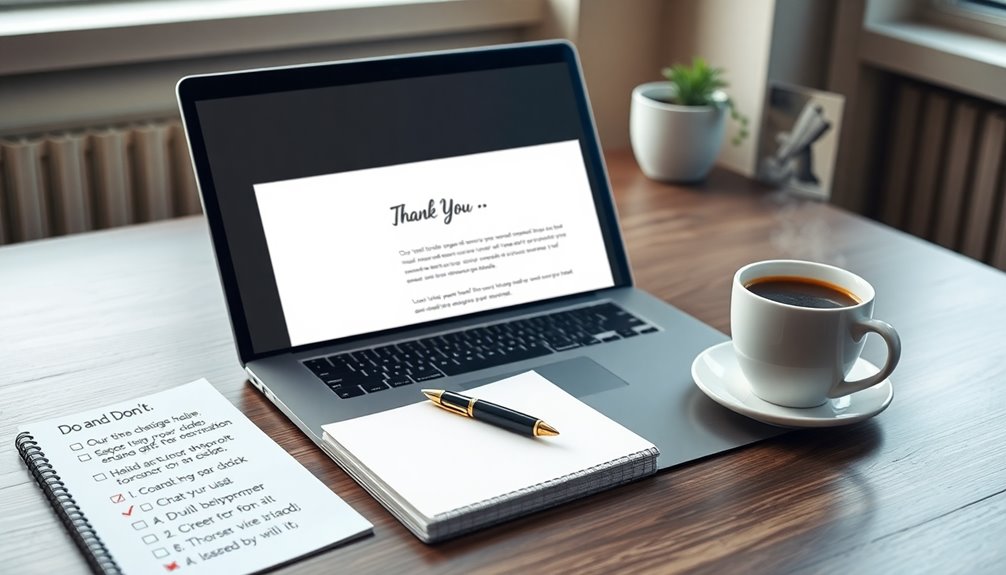
A well-crafted thank you email can make all the difference in your job search. To create a lasting impression, do personalize**** your message. Address the interviewer by name and reference specific details from your conversation. This shows engagement and attentiveness.
On the flip side, don't use generic templates; tailor your email to reflect your unique experience.
Next, do express gratitude clearly****. Start with a sincere thank you for the opportunity, as many HR professionals note that thank-you notes can influence hiring decisions.
However, don't overlook proofreading. Grammatical errors and typos can undermine your professionalism, so take the time to review your email carefully.
Additionally, do keep it concise****. Aim for 100-200 words, focusing on key points without unnecessary details to maintain the reader's interest. This helps you communicate effectively while reinforcing your interest in the position.
Maintaining a professional tone throughout your thank you email is crucial, as it reflects your respect for the interviewer and the opportunity. Lastly, consider how your support network can help you navigate the emotional aspects of the job search.
Examples of Thank You Emails
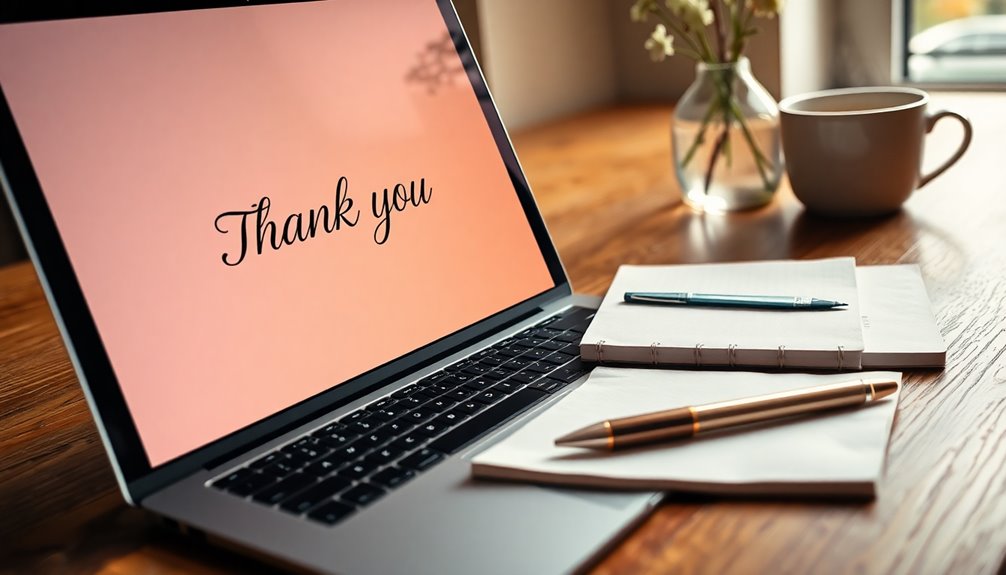
When you send a thank you email, including specific examples from your interview can significantly enhance its impact. For instance, you might say, "I appreciated our discussion about the innovative projects at XYZ Company, especially your insights on the upcoming marketing strategies." This personalization not only expresses gratitude but also reinforces your interest in the role.
Keep your thank you email a concise message, ideally between 100-200 words. This way, you focus on key points without overwhelming the reader. Use a professional tone while still maintaining warmth; this balance creates a lasting impression. You could write, "Thank you for the opportunity to interview for the Marketing Manager position. I'm excited about the possibility of contributing to your team."
Sending your thank you email within 24 hours shows promptness, reflecting your respect for the interviewer's time. Convey your enthusiasm by saying something like, "I'm eager to bring my skills in digital marketing to your innovative team."
Pro Tips for Writing Effective Emails
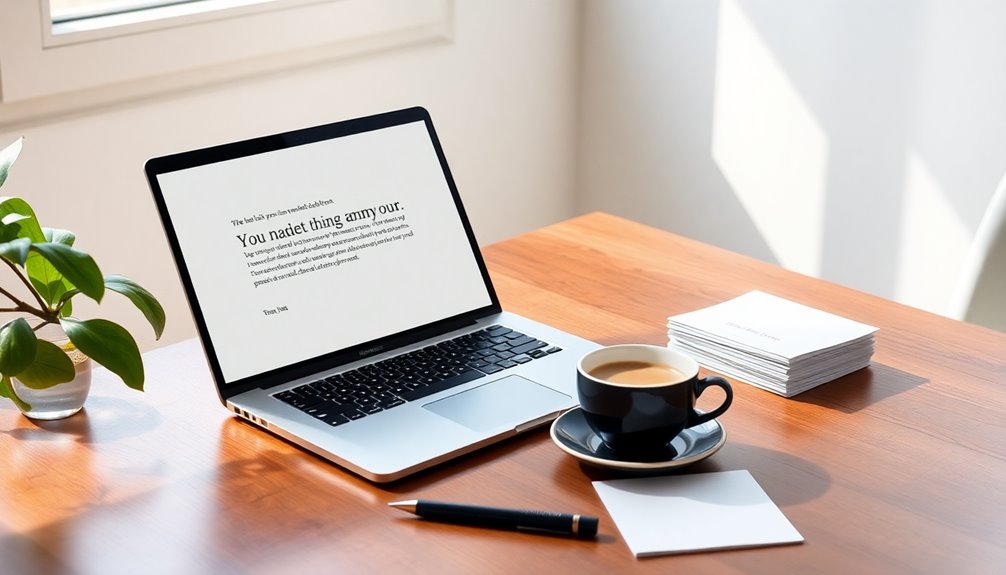
Writing effective emails is crucial in making a strong impression, whether you're following up after an interview or communicating with colleagues. A well-crafted thank you email can leave a lasting impression.
Start by personalizing your message; address the recipient by name and include specific details from your conversation. This shows you're engaged and attentive.
Send your thank you email within 24 hours to express gratitude and reinforce your interest in the position. Timeliness matters—75% of HR professionals believe prompt notes influence hiring decisions.
Keep your email a concise note, ideally between 100-200 words, so you can express gratitude without overwhelming the reader.
Maintain a professional tone throughout. Avoid overly casual language, as 72% of individuals judge candidates based on their written communication quality. This professionalism helps build a positive impression.
Finally, proofreading is essential. Ensure your email is free of grammatical and spelling errors. Error-free communication reflects your attention to detail and professionalism, traits highly valued by employers.
Final Thoughts
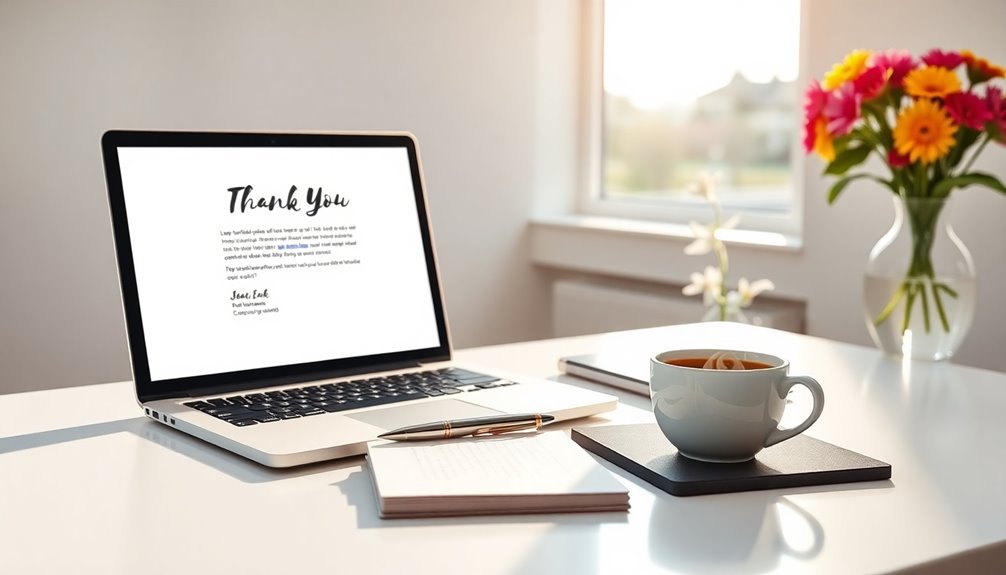
Crafting a thoughtful thank you email can significantly impact your job search and professional relationships. Sending a thank you email within 24 hours of your interview enhances the chances of leaving a lasting impression on hiring managers.
With 75% of HR professionals noting that these emails influence hiring decisions, it's crucial to show genuine appreciation. Personalizing the email by referencing specific topics discussed during the interview demonstrates your professionalism and attention to detail, making you more memorable.
A concise thank you email, ideally between 100-200 words, allows you to express gratitude while reiterating your enthusiasm for the role without overwhelming the reader. Maintaining a professional tone and proofreading for errors reflects your communication skills and commitment to professionalism, qualities highly valued by employers. Additionally, understanding the importance of legal representation during transitions can enhance your communication approach in professional settings.
Frequently Asked Questions
How Do You Express Gratitude in a Professional Email?
To express gratitude in a professional email, start by addressing the recipient by name.
Acknowledge their time and efforts sincerely, making it personal. Reference specific topics you discussed to show you were engaged.
Highlight how their insights positively impacted you, reinforcing the relationship's value.
End with a warm closing that reiterates your appreciation and expresses hope for future interactions.
Keeping it concise ensures your message remains impactful and clear.
How Do You Say Thank You Professionally in an Email?
To say thank you professionally in an email, start with a personalized greeting using the recipient's name.
Clearly express your gratitude for their specific help or opportunity.
Reference key points from your interaction to show you paid attention and value the connection.
Maintain a professional tone with correct grammar and spelling, and keep your message concise to respect their time.
This approach will leave a positive impression.
How Do You End a Professional Email Thank You?
To end a professional thank you email effectively, reiterate your gratitude with a polite remark, like "Thank you once again for the opportunity."
It's important to invite further discussion by encouraging the recipient to reach out with any questions.
Use a warm closing, such as "Best regards" or "Sincerely," followed by your full name.
Don't forget to include your contact information in your email signature for easy communication.
How to Write a Thanks Email for Appreciation?
When you're writing a thank you email for appreciation, start by expressing your genuine gratitude for the recipient's effort.
Mention specific details about what you're thankful for—it shows you value their contribution.
Keep the message concise and maintain a warm tone throughout.
Finally, wrap it up by expressing your desire to continue the relationship, whether through future collaboration or simply staying in touch.
This fosters goodwill and strengthens your connection.
